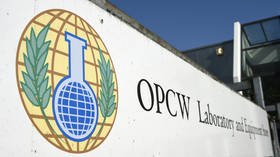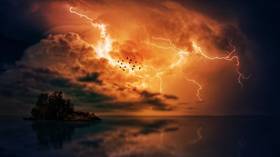OPCW appears to collude with Western nations to pin Navalny’s ‘poisoning’ on Russia, Moscow’s envoy to the watchdog claims to RT

The chemical weapons watchdog OPCW has been stonewalling Russia’s attempts to get to the bottom of the alleged poisoning of Russian opposition figure Alexey Navalny, leading Moscow to question the organization’s motives.
That's according to Alexander Shulgin, Russia’s envoy to the organization, who said that the Technical Secretariat of the Organization for the Prohibition of Chemical Weapons (OPCW) has “derailed” activities that Moscow requested from it in the Navalny ‘poisoning’ case.
Officials offered a joint Russian-OPCW probe over the chemical allegedly used to poison the Russian activist. It would help to better understand the exact circumstances and timeline of the discovery of the toxic chemical in Navalny’s body after he was flown to Germany, Moscow claimed.
The offer was denied “under the pretext there was no precedent for such assistance,” Shulgin told RT. “This was really sad and leads us to believe that the concerted action [against Russia] involves not only certain countries but also the Technical Secretariat.”
Also on rt.com US & allies don’t care about Navalny, want to use alleged poisoning to stigmatize Russia, Moscow’s envoy to OPCW tells RTNavalny fell seriously ill in August 2020 and was flown to Germany for treatment after his condition was stabilized in Russia. The German government and its allies later accused the Russian security services of using a potent military-grade poison in an attempt to murder the opposition activist.
Moscow denied the allegations and said the case appeared to be a frame job by intelligence services hostile to Russia. It said Western nations accusing Russia are obviously pushing their narratives surrounding the case in a coordinated manner. They even produced their responses to the latest Russian queries to them on the same day, Shulgin said.
The OPCW was called in to analyze blood samples taken from Navalny and has confirmed the German analysis of the poison, though its exact formula was never revealed to the public. Russia’s request to disclose it in private was denied by Germany, which, Shulgin pointed out, made no sense since Berlin insists that Russia already possesses it and used it against Navalny.
Moscow has questioned many elements of the Western investigation and says neither the government accusing it nor the OPCW provided reasonable answers. For example, Shulgin said, the OPCW has very strict rules on how material evidence should be handled during investigations to protect the chain of custody. “At every step of the way the handling of evidence is documented and videotaped,” he explained.
Russia asked the Technical Secretariat to provide relevant records in the Navalny case, particularly of the moment his blood was drawn at the Charite hospital in Berlin and the moment the samples were divided at the Hague before being sent to OPCW-certified labs for analysis.
“For months the Technical Secretariat remained silent. Now they have attempted to respond and what we received was incoherent. They are hiding something,” he said. “Note that a lack of the evidence that the chain of custody was fully protected is very significant. All the conclusions made based on that evidence may be deemed null and void.”
The OPCW is expected to be a neutral body that, among other things, provides member states with accurate investigations and scientific analysis of alleged cases of chemical weapon use. Critics say it has deviated from its core mission in recent years, led astray by political considerations.
Also on rt.com Western diplomats need to go back to science class if they believe in Syrian chemical weapons claims, Russian UN envoy saysThe most glaring example was its investigation of the 2018 incident in Douma, Syria, which the OPCW all but blamed on the Syrian government. It was later revealed that the organization’s leadership sidelined its own investigators, whose analysis of the evidence on the ground contradicted that narrative.
The OPCW accusations of Damascus of dropping chlorine canisters on Douma provided justification after the fact for the retaliatory strikes that the US, UK, and France launched against Syria weeks after the incident.
When dissenting inspectors blew the whistle on the situation, the OPCW labeled them as disgruntled former employees who didn’t have access to additional evidence, and refused to address concerns about potential bias in its final report.
If you like this story, share it with a friend!














